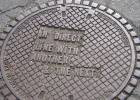
Diemer.ca
Radical Digressions
Samplings
The evidence from all OECD countries shows that the private sector is far more bureaucratic and much less efficient than the public sector when it comes to providing health care.
Ten Health Care Myths
Gentlemen from Hooker - and many other places - are quite literally pouring these and many other poisons into your coffee and your kids' juice. They just do it in a more indirect, anonymous, and apparently socially acceptable way.
150 Years of Dirty Water
Blogs
- Latest Post
- Notebook 11
- Notebook 10
- Notebook 9
- Notebook 8
- Notebook 7
- Notebook 6
- Notebook 5
- Notebook 4
- Notebook 3
- Notebook 2
- Notebook 1
Words of Wisdom
- Capital is reckless of the health or length of life of the laborer, unless under compulsion from society.
- – Karl Marx
Favourite Links
- Connexions
- CounterPunch
- Marxist Archive
- News & Letters
- Bureau of Public Secrets
- Noam Chomsky
- Middle East Resources
- Sources
- More Links...

Constructive criticism can be
a good thing
A Response to Roger Powley
By Ulli Diemer
I was surprised and disappointed to see Roger Powley arguing in the last Toronto Field Naturalist Newsletter that naturalists ought not to criticize other nature lovers even when they act in ways which are harmful to nature, because criticism, even when warranted, might weaken the cohesion of the naturalist movement. As a rule I avidly read and enjoy Roger's contributions, but I think he forgot to put his thinking cap on when he penned that particular piece.
I really cannot agree with his assumption that criticism of another person's actions has to imply a holier-than-thou attitude on the part of the critic. Roger is surely right in saying that all of us sometimes act in ways which hurt the environment. To me, that means that we all occasionally make mistakes which need to be pointed out to us. How does it help the environment if we agree to keep quiet about each other's sometime thoughtlessness or wrongheadedness for the sake of some abstract "unity"?
Perhaps Roger meant to suggest by his 'holier-than-thou' reference that most of us find it rather easy to see other people's faults, but rather harder to see our own. All the more need, then, for others to criticize us if some action of ours contradicts our stated concern for nature and the environment! Perhaps the harmful effect of a particular action had never occurred to us. How are we to find out if no one tells us? One hopes, of course, that the criticism would be presented constructively, not as a personal attack, and one also hopes that one would receive it in the same spirit.
But to refrain from criticism where it is called for is to do both nature and our movement a great disservice. Are we not to criticize egg collectors because they honestly consider themselves naturalists? Is it not valuable to draw attention, as two people did in the last newsletter, to the excesses of birders who consider the identification of a bird so important they will kill it to be sure? Has Roger himself not criticized - and very wittily at that - the misguided parks bureaucrats whose idea of preserving green space is to manicure it into a state of near-lifelessness?
There is unfortunately no question that thoughtless 'nature-lovers' can and do cause great harm to the naturalist movement. We all know that sections of the Bruce Trail are now closed at least partly because of the actions of irresponsible hikers. And we can be sure that birders who trample flowerbeds are not winning any friends for us either. It is our duty to combat such harmful actions, and also to make it clear to the general public that we disapprove of them. We also have responsibility, to ourselves and to each other, to think and analyze clearly, to exchange, discuss, and debate ideas freely and frankly, and to stand up for what we honestly believe is right. Doing so can make us stronger and help us move forward, while artificially submerging disagreements and controversy would only weaken us in the long run.
December 20, 1982
Published in the Toronto
Field Naturalist newsletter.